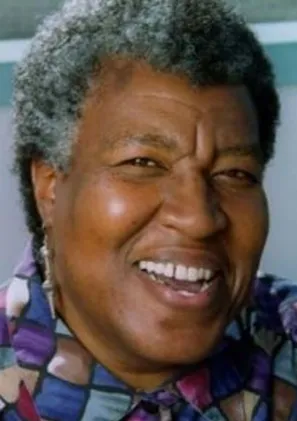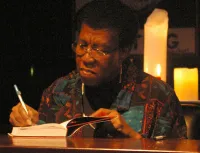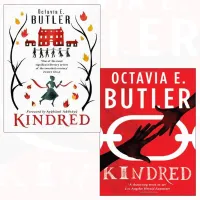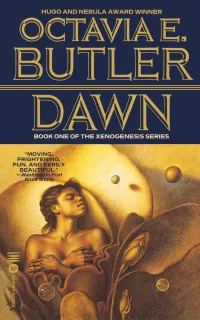Biography
1947 - 2006
"You don't start out writing good stuff. You start out writing crap and thinking it's good stuff, and then gradually you get better at it. That's why I say one of the most valuable traits is persistence."
- Octavia Butler
Raised by her widowed mother in Pasadena, Octavia Butler was a tall, shy, daydreamer who suffered from dyslexia. At age 12, while watching the science fiction movie ‘Devil Girl from Mars,’ she decided she could write a better story: “I turned off the TV and proceeded to try, and I’ve been writing science fiction ever since.” She went on to become the first black woman to gain popularity and critical acclaim as a major science fiction writer. In 1983 Butler won a Hugo Award for Best Short Story for Speech Sounds. A year later she received science fiction literature’s highest honors – winning both The Hugo and Nebula Awards – for her novella Bloodchild. As an African-American lesbian she enriched the genre by bringing race and gender to the foreground of speculative fiction and exploring subjects rarely addressed in sci-fi: racial inequality, politics, slavery and its cultural implications, sexuality, and sexual identity. Butler’s books include the five Patternist novels (1976-1984) as well as the highly regarded Xenogenesis trilogy (1987-1989). She also wrote the mainstream historical novel Kindred (1979). Parable of the Sower (1994) received a Nebula Award nomination for Best Novel; its sequel, Parable of the Talents, won the award in 1998. Butler was the only science fiction author honored with a MacArthur Foundation grant. She died in 2006 after sustaining a head injury in a fall outside her Seattle home. The Octavia E. Butler Scholarship was established in 2006 to enable writers of color to attend the Clarion Science Fiction Writers Workshop where Butler first got her start.
1947 - 2006
"You don't start out writing good stuff. You start out writing crap and thinking it's good stuff, and then gradually you get better at it. That's why I say one of the most valuable traits is persistence."
- Octavia Butler
Raised by her widowed mother in Pasadena, Octavia Butler was a tall, shy, daydreamer who suffered from dyslexia. At age 12, while watching the science fiction movie ‘Devil Girl from Mars,’ she decided she could write a better story: “I turned off the TV and proceeded to try, and I’ve been writing science fiction ever since.” She went on to become the first black woman to gain popularity and critical acclaim as a major science fiction writer. In 1983 Butler won a Hugo Award for Best Short Story for Speech Sounds. A year later she received science fiction literature’s highest honors – winning both The Hugo and Nebula Awards – for her novella Bloodchild. As an African-American lesbian she enriched the genre by bringing race and gender to the foreground of speculative fiction and exploring subjects rarely addressed in sci-fi: racial inequality, politics, slavery and its cultural implications, sexuality, and sexual identity. Butler’s books include the five Patternist novels (1976-1984) as well as the highly regarded Xenogenesis trilogy (1987-1989). She also wrote the mainstream historical novel Kindred (1979). Parable of the Sower (1994) received a Nebula Award nomination for Best Novel; its sequel, Parable of the Talents, won the award in 1998. Butler was the only science fiction author honored with a MacArthur Foundation grant. She died in 2006 after sustaining a head injury in a fall outside her Seattle home. The Octavia E. Butler Scholarship was established in 2006 to enable writers of color to attend the Clarion Science Fiction Writers Workshop where Butler first got her start.
Demography
Demography
Gender Female
Sexual Orientation Lesbian
Gender Identity Cisgender
Ethnicity African American Black
Nations Affiliated United States
Era/Epoch Information Age (1970-present)
Field(s) of Contribution
Author
Commemorations & Honors
Hugo Award for Best Short Story- Speech Sounds (1984)
Hugo Award for Best Novelette- Bloodchild (1985)
John D. and Catherine T. MacArthur Foundation Genius Grant (1995)
Los Angeles Times Bestseller– Parable of the Talents (1999)
Lifetime Achievement Award in Writing from the PEN American Center (2000)
Langston Hughes Medal of The City College (2005)
Chicago State University's International Black Writers Hall of Fame Inductee (2005)
Posthumous Science Fiction Hall of Fame Inductee (2010)
International Astronomical Union Named a Charon Mountain Butler Mons After Her (2018)
Google Doodle Commemorating Butler's 71st Birthday (2018)
Demography
Gender Female
Sexual Orientation Lesbian
Gender Identity Cisgender
Ethnicity African American Black
Nations Affiliated United States
Era/Epoch Information Age (1970-present)
Field(s) of Contribution
Author
Commemorations & Honors
Hugo Award for Best Short Story- Speech Sounds (1984)
Hugo Award for Best Novelette- Bloodchild (1985)
John D. and Catherine T. MacArthur Foundation Genius Grant (1995)
Los Angeles Times Bestseller– Parable of the Talents (1999)
Lifetime Achievement Award in Writing from the PEN American Center (2000)
Langston Hughes Medal of The City College (2005)
Chicago State University's International Black Writers Hall of Fame Inductee (2005)
Posthumous Science Fiction Hall of Fame Inductee (2010)
International Astronomical Union Named a Charon Mountain Butler Mons After Her (2018)
Google Doodle Commemorating Butler's 71st Birthday (2018)
Resources
Resources
http://www.slate.com/articles/news_and_politics/obit/2006/03/octavia_butler.html
http://www.guardian.co.uk/news/2006/mar/16/guardianobituaries.bookscomment
https://time.com/5225461/octavia-butler-janelle-monae/
https://www.lgbtqnation.com/2019/02/overcame-dyslexia-become-award-winning-sci-fi-author/
https://www.essence.com/culture/octavia-butler-google-doodle/
https://ubuntubiographyproject.com/2017/06/21/octavia-butler/
https://www.bbc.com/culture/article/20200317-why-octavia-e-butlers-novels-are-so-relevant-today
Resources
http://www.slate.com/articles/news_and_politics/obit/2006/03/octavia_butler.html
http://www.guardian.co.uk/news/2006/mar/16/guardianobituaries.bookscomment
https://time.com/5225461/octavia-butler-janelle-monae/
https://www.lgbtqnation.com/2019/02/overcame-dyslexia-become-award-winning-sci-fi-author/
https://www.essence.com/culture/octavia-butler-google-doodle/
https://ubuntubiographyproject.com/2017/06/21/octavia-butler/
https://www.bbc.com/culture/article/20200317-why-octavia-e-butlers-novels-are-so-relevant-today










